Don't Fall for Keto Scams
THE KETONE CRAZE
In recent years the ketogenic diet has become the latest diet trend. In contrast to the conventional low-fat, high-carb diet, the ketogenic diet is just the opposite—very low-carb and high-fat. The research has been highly impressive with more favorable results with weight loss and improved health markers than the standard low-fat dietary approach.
The secret behind the ketogenic diet is that it shifts the body from burning sugar (glucose) to burning fat as its primary source of fuel. Excess body fat is burned off, promoting weight loss. Fat is a far more efficient fuel than glucose and triggers metabolic changes that improve overall health. The key feature of the diet is the production of ketones—primarily beta-hydroxybutyrate or BHB—an alternative form of fuel produced by the liver from fatty acids. When your body begins to use ketones as a major source of fuel, you are in what is referred to as nutritional ketosis.
The ketogenic diet provides many health benefits including weight loss, increased energy levels, improved mental function, better blood sugar control, improved cardiovascular health, and protection from cancer, to name a few.
Many of the benefits come from reducing the amount of carbohydrate consumed and many come from the body’s use of ketones as a source of fuel. In fact, studies have shown that ketones themselves can produce many desirable effects including:
• Appetite suppression and weight loss
• Improved cognition/memory
• Increased energy
• Better mood
• Increased endurance and athletic performance
• Reduced inflammation
• Better sleep
Traditionally, the only way you could increase blood ketone levels was by going on a ketogenic diet, fasting, or by consuming a source of medium chain fatty acids, such as coconut or MCT oil. In recent years, ketone dietary supplements have entered the market. These are not MCTs but ketone salts that directly raise blood ketone levels. Ketone salts are made of beta-hydroxybutyrate that are combined with potassium, calcium, sodium, or magnesium to improve absorption. This is the type of ketone supplement currently used in all commercial dietary supplements. Researchers use another form, called ketone esters, in which beta-hydroxybutyrate is linked to an alcohol, but they are very expensive and currently only used in research. These products are referred to as exogenous ketones because they originate from a source outside the body. This is in contrast to endogenous ketones, which are produced in the body by the liver.
The advantage of supplemental ketones is that they provide an almost instant source of ketones without the need of changing the diet or consuming large quantities of MCT oil or coconut oil. Like endogenous ketones, exogenous ketones provide you with all the same health benefits that ketones have to offer. For many people it is far easier to stir a spoonful of ketones into a glass of water or juice and drink it, than it is to make dramatic changes to the diet or take several spoonfuls of MCT oil. Another benefit is that it doesn’t upset the stomach like large amounts of MCT oil or coconut oil can; although depending on the added ingredients (MCTs), some brands can cause stomach upset. With exogenous ketones you can raise blood ketones to therapeutic levels with one dose mixed with a little water. Exogenous ketone supplements will raise blood ketones for about 2 to 3 hours and can be taken up to three times a day.
There are also some disadvantages to exogenous ketones. The most prominent perhaps is the taste. They taste terrible. Some brands add flavorings and sweeteners to their products to make them more palatable. Sometimes people forget that these are dietary supplements, not shakes or beverages, and they aren’t supposed to taste like candy.
Another issue is the price. The process of making ketone salts is expensive and for this reason, exogenous ketones supplements are pricy. You will pay $40 to $60 for one container that may provide 16 to 20 servings. Expect to pay anywhere from $2 to $4 per serving. The more expensive brands cost as much as $6.50 per serving. Companies often recommend two servings at day. This means 60 servings per month for a total of $390 monthly. That’s a lot to pay for a supplement.
Because of the growing popularity of the ketogenic diet, there has been an explosion of interest in ketone supplements. The ketogenic diet requires a definite change in eating patterns and some degree of effort to maintain. Taking a dietary supplement to achieve much of the same benefits, without changing the diet, is appealing to many people. For this reason, a multitude of ketogenic supplements of all types have burst onto the market—some of them useful and others a complete waste of money. Because of the many choices, it can be difficult to tell the difference between them. Many claim to be the best on the market or the most effective, and often make wild claims or insist that their product is the number one choice to burn fat and lose weight or boost brain power, or whatever. With so many products on the market, it can be confusing for consumers.
The words keto, ketone, and ketogenic are thrown around loosely by supplement manufacturers. Many companies use these terms as brand names or to describe certain products that are essentially just vitamin and mineral supplements, and nothing more. They do this to cash in on the keto craze, hoping customers will purchase their products thinking they will enhance ketogenesis. Many of these “keto” supplements contain only MCTs and are way overpriced. True ketogenic supplements contain exogenous ketones in the form of beta-hydroxybutyrate (BHB). If the product does not contain BHB, it is not an exogenous supplement and will not increase blood ketones (unless it contains MCTs). BHB, however, can raise blood ketones much higher than MCTs can.
Because terms like “keto” and “ketone” can be used indiscriminately on any product, determining which truly supply exogenous ketone can cause confusion. Here are the things you need to look for when purchasing a useful exogenous ketone supplement.
INGREDIENTS
The first thing you need to do is look at the list of ingredients. The following are some of the ingredients you may find in these supplements.
BHB
The primary ingredient in any exogenous ketone supplement is beta-hydroxybutyrate (BHB). If it doesn’t have this ingredient it is not an exogenous ketone supplement. BHB must be in the form of a ketone salt and therefore must be bound to sodium, magnesium, calcium, or potassium. Generally, the product will contain BHB in 3 or 4 of these forms.
Ketone salts are the only ingredients the supplement needs to be effective. However, many brands add various other ingredients. If the product is in powder form it will generally also contain silicon dioxide and calcium silicate as anti-caking agents and to add bulk. If it is in a liquid form it doesn’t need these ingredients, but may contain citric acid and/or sodium hydroxide as a preservative and to maintain pH.
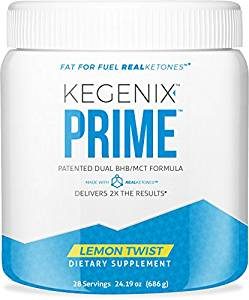 MCT Oil
MCT Oil
The most common additional ingredient is MCT oil. This oil is added because it is naturally ketogenic, meaning it can be converted directly into the BHB by the liver. It is added to boost the ketogenic effect of the supplement without using additional BHB, which is much more expensive. MCT oil is added primarily to reduce the costs of producing the supplement. Adding MCT oil effectively dilutes the supplement making it less effective, but much cheaper to produce. If you pay $3 to $6 per serving, for a product containing MCT oil or powder, you are paying a premium price for MCTs that you can get for a fraction of the price elsewhere. There is no reason to add MCTs except to dilute the formula and cut manufacturing costs.
Sweeteners and Flavorings
Because the taste of BHB is so bad, many brands add sweeteners and flavorings to mask the taste. Common sweeteners include erythritol, stevia, and rebaudioside A (another name for stevia extract). The primary problem with using sweeteners is that they are all anti-ketogenic, even more so than refined sugar. Noncaloric sugar substitutes interfere with the natural production of ketones in the liver. The ketone salts from the supplement will still boost blood ketone levels, but sweeteners will actually hamper ketone production in the liver. If you are taking a ketone supplement as an aid to a ketogenic diet, the supplement will slow down your own body’s ketone production.
Caffeine and Malic Acid
Ketone supplements are supposed to give a boost of energy and are often used by athletes for this purpose. Some brands add caffeine, so the boost of energy they feel may actually come from the caffeine. A single dose of a ketone supplement may contain the same amount of caffeine as 2 cups of coffee. Other products contain malic acid, which is known for its ability to increase energy and tolerance to exercise. When you use ketone supplements containing ingredients like this, how do you know if the effects are from ketones or one of these other (less expensive) ingredients?
Proprietary Blend
Another common additive is the manufacturer’s secret recipe, also known as their “Proprietary blend.” This could include anything—aspartame or other sweeteners, MCT powder, caffeine, maltodextrin, etc. Because it is a proprietary blend they don’t have to disclose the ingredients. These blends are often kept secret so there is no way of telling how much BHB they contain or how much MCT powder might be present. For all we know, a product might consist of all MCT powder with no actual BHB. If a product does not specifically list BHB and the quantity it contains, it is safe to assume it contains little or none. Since anything could be included in the proprietary blend, it is best to pass on any ketone supplement that lists a proprietary blend without specifying exactly what is in the blend or how much BHB it contains.
Miscellaneous Ingredients
A multitude of binders, fillers, preservatives, and other ingredients may be included. Some ingredients you might see are L-taurine, fermented L-leucine, natural flavor, artificial flavor, xanthan gum, citric acid, Bioperine, beta-carotene, and guar gum, potassium sorbate, sodium benzoate, and various vitamins and minerals. Adding vitamins, minerals, and herbs may be nice, but have no beneficial effect on boosting ketone levels.
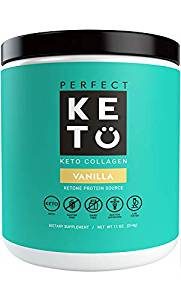 Misleading Labels
Misleading Labels
Some brands contain absolutely no BHB at all. They may include the word “Keto” on the label. It may be a part of the product name, such as Keto Collagen or 7-Keto Gold, but may not state anywhere on the package that it is a ketone supplement, only inferring such by the name of the product. People not knowing much about ketone supplements may purchase these products thinking they are less expensive exogenous ketone supplements. They are actually just expensive vitamin and mineral supplements and nothing more.
Many others will promote their products as being ketone supplements, but contain only MCT powder or oil and no BHB. Many powdered protein and collagen drinks masquerade as ketone supplements.
THE KETONE TEST
The highest quality ketone supplements contain only BHB as the active ingredient with as few additional ingredients as possible. The addition of all other ingredients dilutes the product and in some cases contaminates it.
Normally, we always have some level of ketones in our blood (0.1 mmol/l or less). The therapeutic effects of ketosis kick in when blood levels reach a minimum of about 0.5 mmol/l. This is a level that can be reached by simply consuming a source of MCTs or by a 24-36 hour water fast. An overnight fast (about 8-10 hours) will raise ketone levels to about 0.2 mmol/l. Studies using ketone esters (ketones bound to alcohol) typically raise blood ketones to the 1 to 2 mmol/l level. This is the range at which most of the benefits of ketones have been documented in medical research using exogenous ketone supplementation.
An interesting informal study was conducted by the staff of the Diet Doctor website, under the supervision of Andrreas Eenfeldt, MD. They tested four popular ketone supplements on four volunteers using a blood monitor. Each subject tested each supplement on different days separated by a two-day washout period; the results were compared to a placebo (artificially flavored drink with no ketone producing properties). Blood ketones were measured 60 minutes after taking the supplements.
Brands often sell several products with various flavorings and sweeteners added. The products tested in this study included:
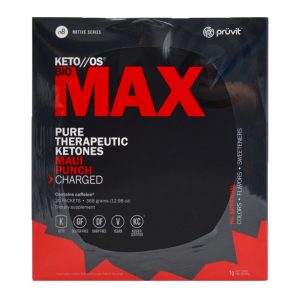
-
Brand: Pruvit
Product: Keto-OS Max, maui punch flavor
Amount of BHB: Unknown, proprietary blend
Price per serving: $6.50
Other ingredients: Erythritol, L-taurine, fermented L-leucine, malic acid, natural flavor, stevia, xantham gum, citric acid
Deprecated: Creation of dynamic property Cornerstone_Classic_Renderer::$orchestrator is deprecated in /home/dh_73hvn9/coconutresearchcenter.org/wp-content/plugins/cornerstone/includes/_classes/classic/class-classic-renderer.php on line 20
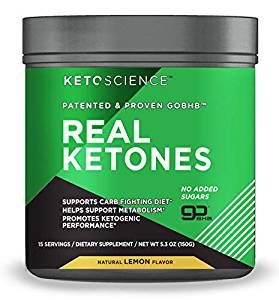
Brand: Real Ketones
Product: Kegenix prime, orange blast flavor
Amount of BHB: Unknown, proprietary blend
Price per serving: $2.00
Other ingredients: MCT powder, citric acid, natural flavors, silica, guar gum, rebaudioside A, and beta carotene (color)

Brand: Perfect Keto
Product: Base exogenous ketones, chocolate sea salt flavor
Amount of BHB: 11.38 g
Price per serving: $3.93
Other ingredients: MCT oil powder, acacia fiber, cocoa powder, natural flavor, stevia leaf extract, monk fruit extract
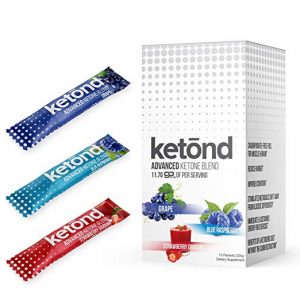
Brand: Ketond
Produce: Advanced ketone blend, grape flavor
Amount of BHB: 11.7 g
Price per serving: $2.67
Other ingredients: Citric acid, natural and artificial flavors, beetroot extract, stevia, malic acid, riboflavin (color)
Results
Brand Change in blood ketones (mmol/l)
Placebo -0.05
Real Ketones -0.03
Perfect Keto +0.23
Ketond +0.48
Pruvit +0.63
After 1 hour the average blood ketone level in the four subjects after taking the placebo decreased by 0.05 mmol/l below starting level. Interestingly, Real Ketones also had a decrease in ketones by 0.03 mmol/l, indicating that some supplements may actually decrease your ketone levels rather than raise them. The amount of BHB in this brand is unknown since this figure is included in its secret proprietary blend. It may or may not have any BHB and may be relying on its MCT content for its proposed ketogenic effect. The decrease in blood ketones from this product is probably due to some other ingredient, mostly likely rebaudioside A (stevia extract) which is known to interfere with ketone metabolism.
Perfect Keto and Ketond brands raised blood ketones only 0.23 and 0.48 mmol/l respectively, about the same amount you would expect from taking an MCT supplement. Both claim to contain over 11 grams of BHB per serving and Perfect Keto even has the addition of MCT powder. Again, perhaps another ingredient is interfering with ketone metabolism. Both contain stevia.
Pruvit gave the best results with an increase ketone above base level of 0.63 mmol/l. Even so, this is not much more than you could expect with MCTs alone. Their proprietary blend does not disclose how much BHB is in the product or if it relies primarily on MCTs for its effect. It was by far the most expensive of the group, at $6.50 per serving.
Using a urine ketone test strip, the last three products would give a reading that would range from trace to small. If you are going to use a ketone supplement, you want a product that will raise ketones enough to register at least small to moderate after 30 to 60 minutes.
RECOMMENDATIONS
The experiment above evaluated two brands that contained 11 grams of BHB but had only a modest effect on blood ketones, suggesting that you want a product with no less than 11 grams of BHB per serving.
Products that state a proprietary blend without specifying the amount of BHB are suspect. There is no way to tell how much BHB and how much MCTs are used. You would have to test them yourself and see how effective they are. Interestingly, both of the above brands with proprietary blends and unknown BHB content, are sold through multi level marketing.
Sweeteners may interfere with ketone metabolism, so you want to avoid these if possible. Adding sweeteners and flavorings help mask the taste. However, if these ingredients reduce the efficiency of the product, it is counterproductive and a waste of money. It would be much better to combine an unsweetened, unflavored product with a small amount of naturally sweetened orange juice or some other juice. The tiny amount of sugar in a half cup of juice will have far less impact than any sugar substitute.[2]
The best products will contain BHB and little else. Any additional ingredients, including MCTs, dilute the product and in some cases may even interfere with ketone metabolism.
Whatever product you choose, you should evaluate using the urine test strips (or blood monitor if you have one). That is really the only way you can tell if it is effective or not and if it is worth the price.
There are many dozens of products claiming to be keto supplements. Most don’t contain any BHB, so you have to check the ingredients. Many contain only small, ineffective amounts. Ketone salts are expensive, so expect to pay at least $50 per container, or about $2 to $5 per serving.
Two products that I have used, tested, and recommend are:
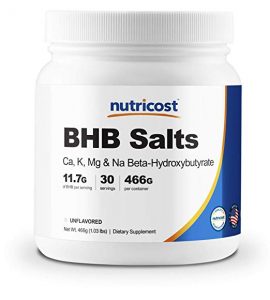
Brand: Nutricost
Product: Ketone Salts, unflavored
Form: Powder
Amount of BHB: 13 g
Price per serving: $1.67
Other ingredients: silicon dioxide and calcium silicate
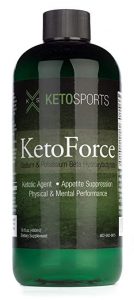
Brand: KetoSports
Product: KetoForce
Form: Liquid
Amount of BHB: 11.7 g
Price per serving: $3.44
Other ingredients: citric acid and/or sodium hydroxide
Both of these products are unflavored and unsweetened. I generally combine one serving in a half cup (4 oz) of water, drink it quickly, and follow with another 8 ounces of water. Yes, the taste is bad, but not unbearable when you chug it down quickly like this. You could add a little lemon juice or citric acid to help mask the taste. You could also, mix a serving in a half cup of juice. Follow with glass of water.
The above products are ones that I have personally used and trust. There may be other brands that are equally as good. You just need to do a little searching. While I was investigating different brands I came across several websites that claim to list the top 10 keto products or warned about falling for keto scams. In each case, the sites were pushing and selling a certain brand and were not fair evaluations. So, be careful about websites that appear to be impartial judges.
Some sites will list reviews from customers, which can be helpful. Many people base their reviews of ketone products primarily on taste. A good tasting product does not necessarily mean an effective product. In fact, the most pleasant tasting products are likely going to be the least effective.
Also, keep in mind that many people are told by the manufacturers to test the supplements first thing in the morning. This can give a false positive reading, so you have to be careful about reviews where people claim the supplement raised ketone levels. The best way to evaluate a supplement is to test it yourself.
References
1. Fife, B. Ketone Therapy: The Ketogenic Cleanse and Anti-Aging Diet. Piccadilly Books, Ltd.: Colorado Springs, CO; 2017.
2. Fife, B. The Stevia Deception: The Hidden Dangers of Low-Calorie Sweeteners. Piccadilly Books, Ltd.: Colorado Springs, CO; 2017.
